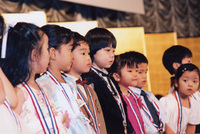Renewal of the youngest age group in PTNA Piano Competition
 Competition for children--- it always becomes the center of question. Then, why not competition and concert?
Competition for children--- it always becomes the center of question. Then, why not competition and concert?
In PTNA Piano Competition 2010, the system of grade A2 (for pre-school children) will be revised. At the final round, after 1st and 2nd stages, finalists will play pieces as in a concert. There will be neither evaluation nor elimination, just have pleasure of public performance. They are free to choose pieces at the final stage, where previously required to select from mandatory repertoires. This renewal is expected to bring children wider freedom and pleasure of music within the framework of competition.
Then, what is the good aspect of taking part in the competition in early childhood? Here are some testimonies;
Ms.Marie Yamashita, a clerk of Yokohama National University, appreciates her competition experiences in her childhood. "I really enjoyed playing at the PTNA Piano competition for the first time when I was little, though I didn't remember those days clearly. I was satisfied with not only my own achievement, but also listening to performances of my peers also inspired me a lot to have higher musical ambitions. With supports of my parents and teacher, I was encouraged to continue learning piano and took part in the competition from grade A2 to F (under 18), and now enjoying Grandmuse division (amateur).
Teachers also testifies good effects of the competition on one's childhood. Ms.Hideyo Miyajima proves it by comparing two different students who participated in the competition and who did not. Even though they practiced the same pieces, it was clear that the former became more productive and goal-oriented, and her motivation became more concentrated on the music itself rather than rewards. What impressed the teacher further was the respect of parents toward their children.
Ms.Yoriko Miyazaki regards learning piano as a lifetime engagement, and thus thinks the first contact of competition should be a discovery of him/herself, as well as the exercise of impatience and endeavor. According to her, the competition result is not a big deal, but the fact that they made efforts is the real importance and will affect to their lifelong personal development, especially after they graduate from university and go into the real world.
The first contact is always important which possibly decides how to make approach to certain things. In this context, the new grade A2 becomes more important which could offer children greater oppotunity of music appreciation.